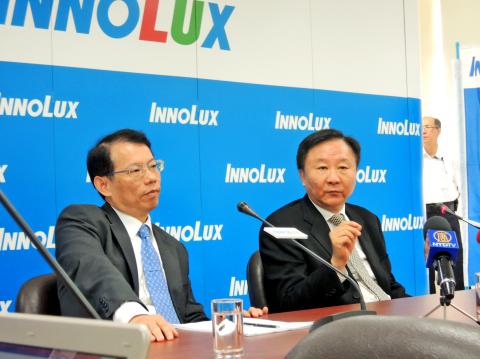Innolux Corp (群創光電), the world’s fourth-largest LCD panel maker, yesterday said it expects a solid second half on the back of increasing demand for panels for notebook computers and ultra-high-definition TVs.
The company said its shipments of 4K2K TV panels grew in March and April, ahead of the FIFA World Cup.
Statistics compiled by market researcher NPD DisplaySearch showed that shipments of flat-panel TVs to World Cup host Brazil soared 57 percent year-on-year to 3.3 million units in the first quarter.

Photo: Chen Mei-ying, Taipei Times
Innolux said it expects the growth momentum to extend into September, when television makers start restocking in preparation for the October holiday shopping spree in China.
“The second quarter will be a better period than the first quarter, and we expect a vigorous second half as well,” Innolux president Wang Jyh-chau (王志超) told reporters after the firm’s annual general meeting.
Panel supplies for mainstream 39-inch, 40-inch and 42-inch TVs have tightened lately, while demand for TV panels bigger than 50-inches has also grown rapidly, Wang said.
In addition, global demand for 4K2K TVs has picked up at a faster-than-expected pace, he said.
“In April, worldwide 4K2K TV penetration jumped to 6.8 percent of overall flat-panel TVs, from 4 percent in March,” he said. “Client demand for ultra-high-definition TV panels bigger than 40 inches has exceeded what we can supply.”
Wang said he expects the global 4K2K TV penetration rate to exceed 10 percent this year — higher than market forecasts of between 6 and 9 percent.
Innolux is the world’s largest 4K2K TV panel supplier, with a 36 percent market share.
Wang said the company was sticking to its projection that 4K2K panels would account for 20 percent of its TV panel shipments this year.
Asked about the notebook panel supply constraint, Wang attributed it to reduced supply because most panel makers have allocated their capacity to making panels for other applications.
However, it seems that notebook shipments would be stronger than expected this year, he said.
For the whole year, Wang still expects the supply-and-demand situation to remain healthy.
“Market demand is quite good this year,” Innolux chairman Tuan Hsing-chien (段行建) told reporters. “We believe this year and next year will be the turning point... The worst period for the TFT [thin film transistor] industry is over.”
Shareholders yesterday approved a plan to issue 2 billion common shares via a rights issue, or in the form of global depositary receipts. They also gave the green light to a proposal to distribute a cash dividend of NT$0.15 per share, based on last year’s net profit of NT$5.1 billion, or NT$0.57 per share.
That translates into a dividend yield of 1.23 percent, based on the stock’s closing price of NT$12.20 yesterday.

Real estate agent and property developer JSL Construction & Development Co (愛山林) led the average compensation rankings among companies listed on the Taiwan Stock Exchange (TWSE) last year, while contract chipmaker Taiwan Semiconductor Manufacturing Co (TSMC, 台積電) finished 14th. JSL Construction paid its employees total average compensation of NT$4.78 million (US$159,701), down 13.5 percent from a year earlier, but still ahead of the most profitable listed tech giants, including TSMC, TWSE data showed. Last year, the average compensation (which includes salary, overtime, bonuses and allowances) paid by TSMC rose 21.6 percent to reach about NT$3.33 million, lifting its ranking by 10 notches

Popular vape brands such as Geek Bar might get more expensive in the US — if you can find them at all. Shipments of vapes from China to the US ground to a near halt last month from a year ago, official data showed, hit by US President Donald Trump’s tariffs and a crackdown on unauthorized e-cigarettes in the world’s biggest market for smoking alternatives. That includes Geek Bar, a brand of flavored vapes that is not authorized to sell in the US, but which had been widely available due to porous import controls. One retailer, who asked not to be named, because

SEASONAL WEAKNESS: The combined revenue of the top 10 foundries fell 5.4%, but rush orders and China’s subsidies partially offset slowing demand Taiwan Semiconductor Manufacturing Co (TSMC, 台積電) further solidified its dominance in the global wafer foundry business in the first quarter of this year, remaining far ahead of its closest rival, Samsung Electronics Co, TrendForce Corp (集邦科技) said yesterday. TSMC posted US$25.52 billion in sales in the January-to-March period, down 5 percent from the previous quarter, but its market share rose from 67.1 percent the previous quarter to 67.6 percent, TrendForce said in a report. While smartphone-related wafer shipments declined in the first quarter due to seasonal factors, solid demand for artificial intelligence (AI) and high-performance computing (HPC) devices and urgent TV-related orders

MINERAL DIPLOMACY: The Chinese commerce ministry said it approved applications for the export of rare earths in a move that could help ease US-China trade tensions Chinese Vice Premier He Lifeng (何立峰) is today to meet a US delegation for talks in the UK, Beijing announced on Saturday amid a fragile truce in the trade dispute between the two powers. He is to visit the UK from yesterday to Friday at the invitation of the British government, the Chinese Ministry of Foreign Affairs said in a statement. He and US representatives are to cochair the first meeting of the US-China economic and trade consultation mechanism, it said. US President Donald Trump on Friday announced that a new round of trade talks with China would start in London beginning today,